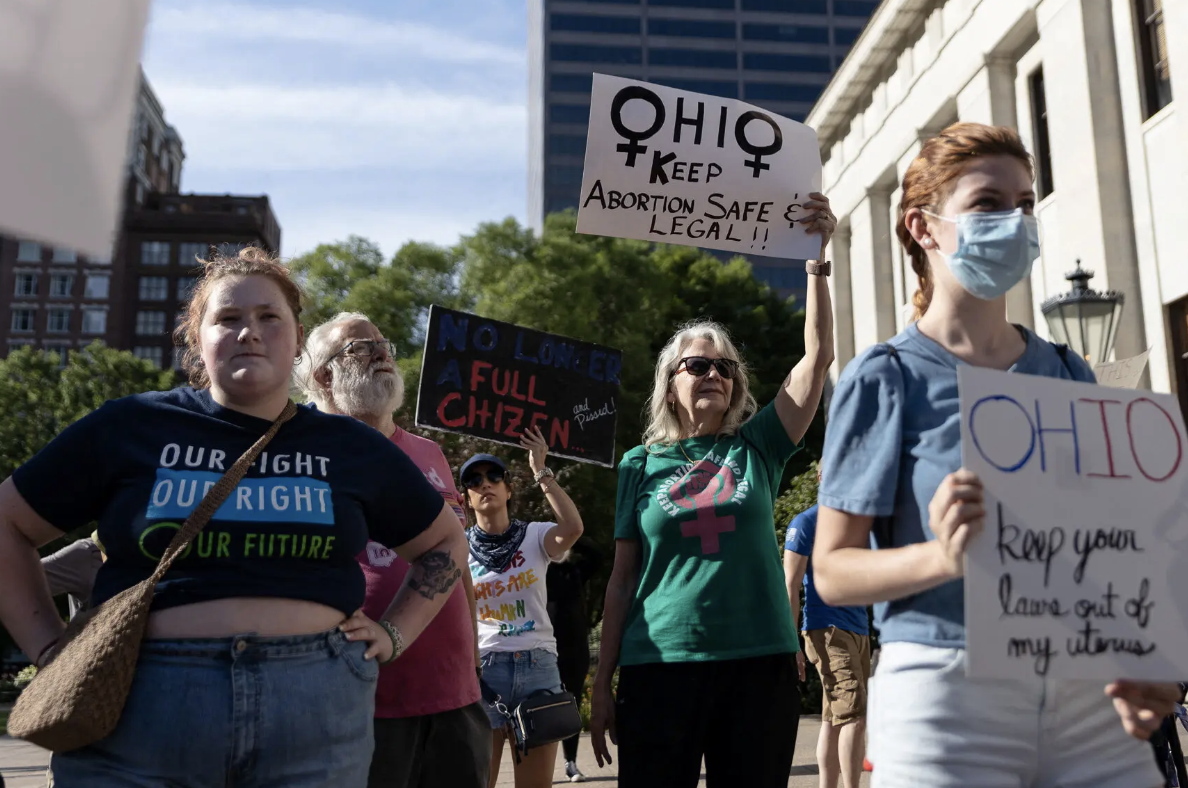OPINION: A win for abortion proponents, Ohio judge grants abortion ban block
“Abortion rights supporters at a rally in Columbus, Ohio, in June,” Photo by Megan Jelinger, Reuters.
Julianna Rittenberg is a sophomore studying political science and an opinion writer for The New Political.
Please note that these views and opinions do not reflect those of The New Political.
On Sept. 14, an Ohio judge temporarily blocked a state law banning abortions performed after the detection of cardiac activity, usually around six weeks into a pregnancy. The ban took effect in June after the U.S. Supreme Court's Dobbs v. Jackson Women's Health Organization decision.
The temporary restraining order, or block, restores abortion access until Sept. 28 and allows for abortions to be performed for up to 20 weeks. During these two weeks, lawyers from both sides of the abortion debate will continue to argue their cases and the judge will decide whether to grant a preliminary injunction against the ban, which would be for an indefinite amount of time.
Hamilton County Court of Common Pleas Judge Christian Jenkins cited the Ohio Constitution as his reason for the block, stating that a 2011 health care freedom amendment to the constitution allowed for "a direct recognition of the fundamental nature of the right to freedom in health care decisions."
In his ruling, Judge Jenkins stated: "No great stretch is required to find that Ohio law recognizes a fundamental right to privacy, procreation, bodily integrity and freedom of choice in health care decision making." He went on to state that abortion is included under the definition of health care, so it is therefore protected.
The defendants of the case, led by Ohio Attorney General Dave Yost, were defending the existence of the Heartbeat Bill. Their case was based on the following: 1) the 2011 health care freedom amendment does not apply in cases of health care regulation, merely in cases concerning the Affordable Care Act, and 2) that S.B. 23, dubbed the Heartbeat Bill, does not single out people who are pregnant but applies to everyone. Judge Jenkins disagreed with the State Defendants on these matters, leading him to rule with the prosecutors.
While in this case, the defendants were seeking a ruling in favor of a state-level abortion ban, last week, U. S. Senator Lindsey Graham introduced a national 15-week abortion ban. This news comes despite claims from Republicans that abortion issues would be left to the states after the Dobbs decision. Republicans across the country have campaigned on the idea that abortion is a state issue, not a federal one. Now, just six weeks before Election Day, Graham has thrown a wrench in a major Republican messaging tactic.
However, Democratic messaging just got a win. All along, Democrats have said that Republicans want to ban abortion at a national level, despite Republican protests. Graham's bill proposal gives fuel to the Democratic fire, motivating Democrats to run for office in states where abortion access is on the line.
Newly registered voters in Ohio are 54% women since the Dobbs decision, compared to 47% before the decision. This is the second highest jump of any state, just behind Kansas.
We will have to wait for November to see this impact. Abortion is a high-priority issue among young voters, Democrats and women. Unlike other states, there is not an abortion issue on the ballot in Ohio this year. However, the candidates on the ballot will determine abortion rights in the state for years to come.
If Ohioans supporting abortion rights want a chance to stop the Heartbeat Bill permanently and counteract anti-abortion policies that are dangerous to women, then we need to vote.
Register to vote now. Vote in November. Make sure your friends vote.

